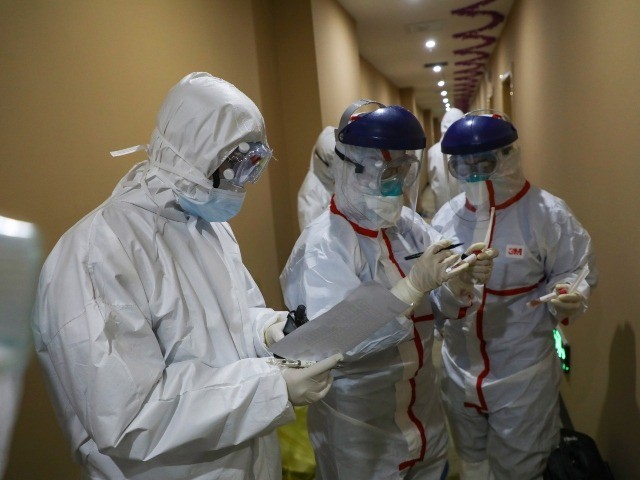The Communist Party dismissed the director of Hubei province’s health commission and the Party leader in charge of it on Tuesday, the deadliest day so far since the coronavirus outbreak in that region began.
Hubei, whose capital Wuhan is believed to be where the never-before-seen form of coronavirus originated, has documented the highest number of coronavirus cases and deaths, which surpassed 1,000 worldwide on Tuesday. The two firings in the province follow the dismissal of several low-level figures amid local concerns of a complete purge of government agents in the area as punishment for allowing the outbreak to become as severe as it has.
Adding to tensions was the news of the deployment of officials from Beijing’s National Supervisory Commission to Hubei to inspect the performance of the Party’s officers there. The National Supervisory Commission is an “anti-corruption” watchdog agency that dictator Xi Jinping regularly uses to purge people he considers disloyal to him personally from the party. The creation of the committee was branded as part of sweeping reforms to help Xi prevent pro-democracy opinions from “polluting” the “political ecology” of China.
China hid the extent of the danger presented by the newly discovered virus for nearly the entire first month of the outbreak in Wuhan, taking 20 days to alert the public of a contagious disease since indicating to the World Health Organization (WHO) that an outbreak had begun. As a result, hospitals did not properly isolate patients exhibiting the flu-like symptoms associated with the novel coronavirus, and local officials allowed high-risk, crowded events in observance of the Lunar New Year to take place, exacerbating the spread of the virus.
Xi Jinping has largely hidden from public view since the outbreak began, making a rare appearance on the streets of Beijing on Monday in which he called for a “people’s war” on coronavirus. His tour of a local community in the city he lives in contrasted starkly with his second-in-command, Premier Li Keqiang, visiting Wuhan itself shortly after officials announced that they had identified a new type of coronavirus in January.
In an apparent move to quell popular outrage at the Communist Party, Beijing has begun dismissing local officials.
On Tuesday, Hubei officials fired Zhang Jin, the Party official at the head of Hubei’s public health commission, and Liu Yingzi, the health professional actually running the agency. Rather than hiring replacements, Beijing is tasking Wang Hesheng of the National Health Commission with the responsibilities of both positions, according to Hong Kong’s RTHK.
Joining Wang will be a special task force from Beijing’s National Supervisory Commission sent not to supervise overall coronavirus response but to investigate the situation surrounding the death of Dr. Li Wenliang, who died at the age of 34 last week. Li was one of eight people arrested by Wuhan police in January for allegedly spreading “rumors” about the new coronavirus. Wu had warned on a message board for doctors that he believed the cases of respiratory illness he had treated in the city were contagious and a new type of disease. There is no evidence he shared false information.
Police detained Li and forced him to sign a humiliating statement confessing to “severely disturbing the public order.” Less than a month later, Li reportedly contracted the virus himself and suddenly died.
Li is one of the only known cases of an otherwise healthy young person dying after being identified as a carrier of the virus.
Li’s death has triggered national outrage at the Chinese government, which Chinese state media outlets are trying to channel by retroactively proclaiming Li a “martyr” and “hero.” The National Supervisory Commission will presumably punish those who silenced him.
The South China Morning Post reported that yet another Beijing official close to Xi, Chen Yixin of the Central Political and Legal Affairs Commission, flew into Hubei province and has already begun to berate local officials, demanding they ensure all suspected coronavirus patients get tested.
“Admitting all critically ill patients is the most urgent and important task … It is the bottom line and a strict order. … There is no room for bargaining, it must not be delayed, and there are no excuses,” the Morning Post quoted Chen as saying.
Mounting reports from Wuhan suggest that, far from attempting to diagnose and treat patients as soon as possible, Wuhan medical staff have orders to turn away any patients not “approved” by higher-up hospital officials. By not treating potential coronavirus cases, the Chinese regime can deflate the official number of cases it documents to the World Health Organization. Some reports have collected evidence of large untold numbers of Wuhan residents dying in their homes, then cremated in secret, erased from the official books chronicling the outbreak.
The recently fired Hubei officials join Tang Zhihong, the head of the health commission in the city of Huanggang, a suburb of Wuhan. Tang was fired in late January after allegedly failing to be able to tell state television how many open beds local hospitals had for patients. Tang also appeared not to know if Huanggang had sufficient resources to fight the outbreak, or what resources the city had at all.
Joining Tang in being fired are reportedly dozens of local officials implicated in the virus outbreak. At press time, no senior officials in Beijing have met a similar fate.

COMMENTS
Please let us know if you're having issues with commenting.